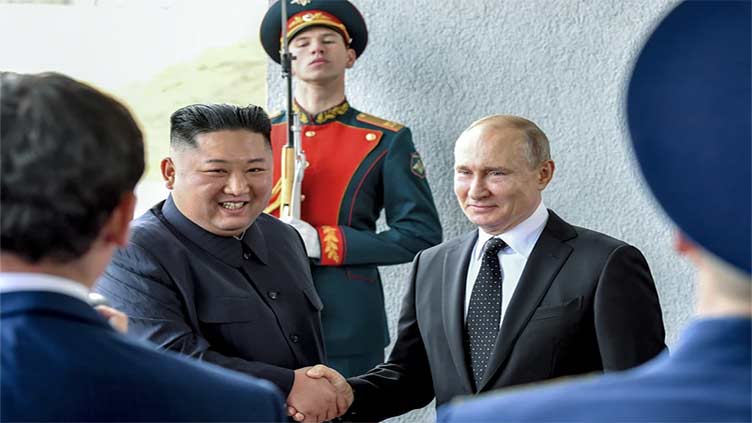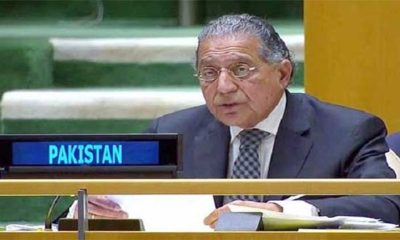A North Korean train presumably carrying North Korean leader Kim Jong Un has departed for Russia for a possible meeting with Russian President Vladimir Putin, South Korean media said Monday.
Citing unidentified South Korean government sources, the Chosun Ilbo newspaper reported that the train likely left the North Korean capital of Pyongyang on Sunday evening and that a Kim-Putin meeting is possible as early as Tuesday.
The Yonhap news agency and some other media published similar reports. Japan’s Kyodo news agency cited Russian officials as saying that Kim was possibly heading for Russia in his personal train.
South Korea’s Presidential Office, Defense Ministry and National Intelligence Service didn’t immediately confirm those details.
US officials released intelligence last week that North Korea and Russia were arranging a meeting between their leaders that would take place within this month as they expand their cooperation in the face of deepening confrontations with the United States. A possible venue for the meeting is the eastern Russian city of Vladivostok, where Putin arrived Monday to attend an international forum that runs through Wednesday, according to Russia’s TASS news agency. The city was also the site of Putin’s first meeting with Kim in 2019.
According to US officials, Putin could focus on securing more supplies of North Korean artillery and other ammunition to refill declining reserves as he seeks to defuse a Ukrainian counteroffensive and show that he’s capable of grinding out a long war of attrition. That could potentially put more pressure on the United States and its partners to pursue negotiations as concerns about a protracted conflict grow despite their huge shipments of advanced weaponry to Ukraine over the past 17 months.
North Korea has possibly tens of millions of artillery shells and rockets based on Soviet designs that could potentially give a huge boost to the Russian army, analysts say.
In exchange, Kim could seek badly needed energy and food aid and advanced weapons technologies, including those related to intercontinental ballistic missiles, nuclear-capable ballistic missile submarines and military reconnaissance satellites, analysts say.
There are concerns that potential Russian technology transfers would increase the threat posed by Kim’s growing arsenal of nuclear weapons and missiles that are designed to target the United States, South Korea, and Japan.
After a complicated, hot-and-cold relationship for decades, Russia and North Korea have been drawing closer to each other since Russia’s invasion of Ukraine in February 2022. The bond has been driven by Putin’s need for war help and Kim’s efforts to boost the visibility of his partnerships with traditional allies Moscow and Beijing as he tries to break out of diplomatic isolation and have North Korea be part of a united front against Washington.
While using the distraction caused by the Ukraine conflict to ramp up its weapons development, North Korea has repeatedly blamed the United States for the crisis in Ukraine, claiming the West’s “hegemonic policy” justified a Russian offensive in Ukraine to protect itself.
North Korea is the only nation aside of Russia and Syria to recognize the independence of two Russian-backed separatist regions in eastern Ukraine — Donetsk and Luhansk -– and it has also hinted at an interest in sending construction workers to those areas to help with rebuilding efforts.
Russia – along with China – have blocked US-led efforts at the UN Security Council to strengthen sanctions on North Korea over its intensifying missile tests while accusing Washington of worsening tensions with Pyongyang by expanding military exercises with South Korea and Japan.
The United States has been accusing North Korea since last year of providing Russia with arms, including artillery shells sold to the Russian mercenary group Wagner. Both Russian and North Korean officials denied such claims. But speculation about the countries’ military cooperation grew after Russian Defense Minister Sergei Shoigu made a rare visit to North Korea in July, when Kim invited him to an arms exhibition and a massive military parade in the capital where he showcased ICBMs designed to target the US mainland.
Following Shoigu’s visit, Kim toured North Korea’s weapons factories, including a facility producing artillery systems where he urged workers to speed up the development and large-scale production of new kinds of ammunition. Experts say Kim’s visits to the factories likely had a dual goal of encouraging the modernization of North Korean weaponry and examining artillery and other supplies that could possibly be exported to Russia.
Jon Finer, US President Joe Biden’s chief deputy national security adviser, told reporters on Sunday that buying weapons from North Korea “may be the best and may be the only option” open to Moscow as it tries to keep its war effort going.
“We have serious concerns about the prospect of North Korea potentially selling weapons, additional weapons, to the Russian military. It is interesting to reflect for a minute on what it says that when Russia goes around the world looking for partners that can help it, it lands on North Korea,” Finer said aboard a plane carrying Biden from India to Vietnam.
Some analysts say a potential meeting between Kim and Putin would be more about symbolic gains than substantial military cooperation.
Russia — which has always closely guarded its most important weapons technologies, even from key allies such as China — could be unwilling to make major technology transfers with North Korea for what is likely to be limited war supplies transported over a small rail link between the countries, they say.
Post Views: 58


 Sports3 months ago
Sports3 months ago
 Fashion3 months ago
Fashion3 months ago
 Sports3 months ago
Sports3 months ago
 pakistan3 months ago
pakistan3 months ago
 pakistan3 months ago
pakistan3 months ago
 World3 months ago
World3 months ago
 World3 months ago
World3 months ago
 Sports2 months ago
Sports2 months ago




















